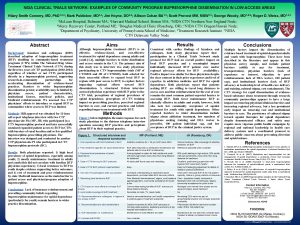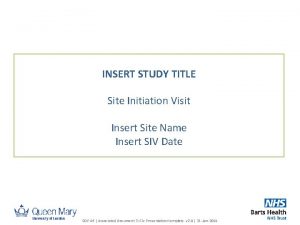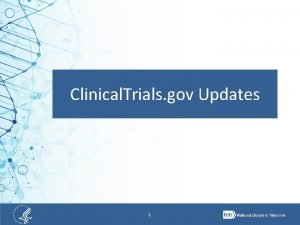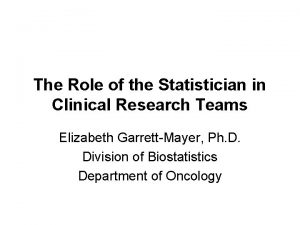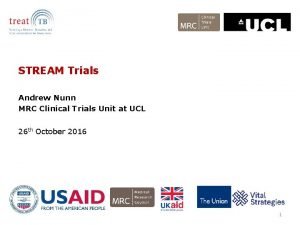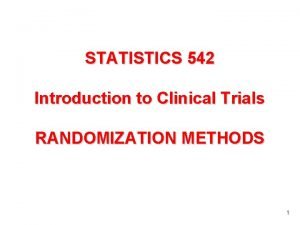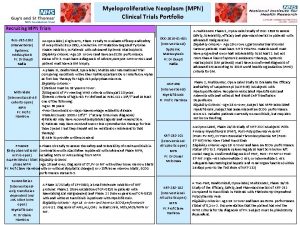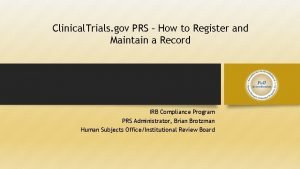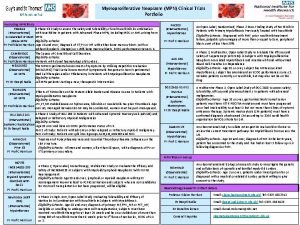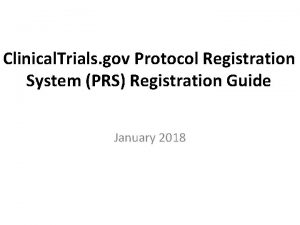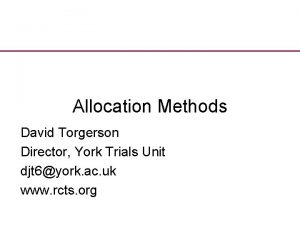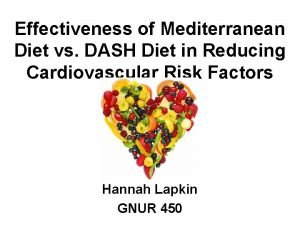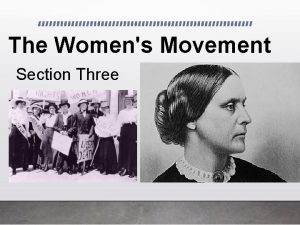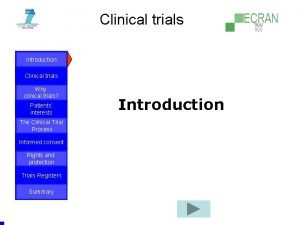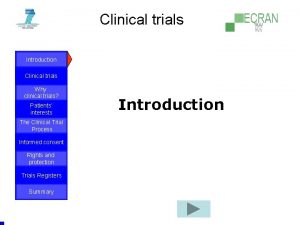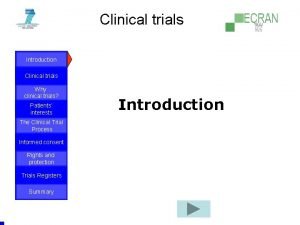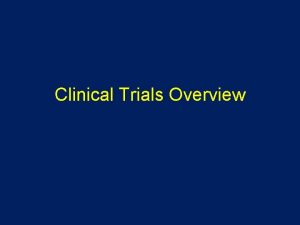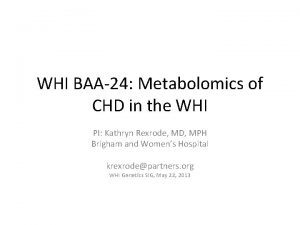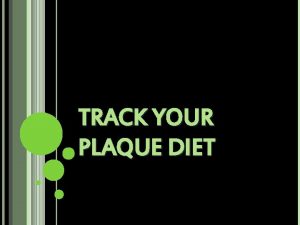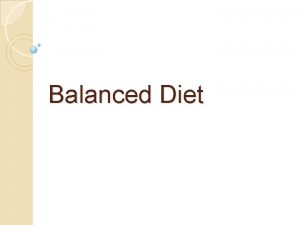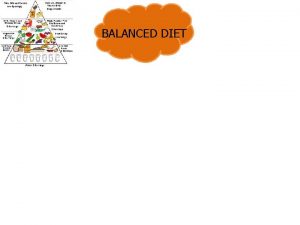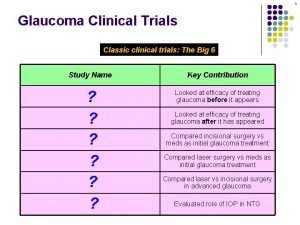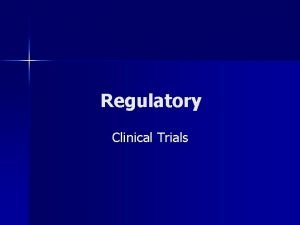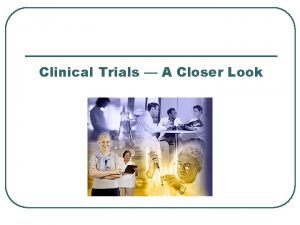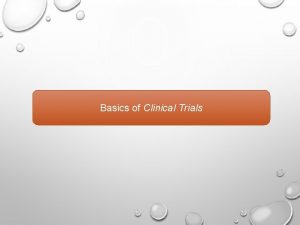Womens Health Initiative WHI Clinical Trials CT Diet


































- Slides: 34

Women’s Health Initiative (WHI) Clinical Trials (CT) Diet Modification (DM) Hormone Replacement Therapy (HRT) Calcium +Vitamin D (Ca. D) Observational Study (OS)

WHI Organizational Chart Working Group (NHLB Advisory Council) Performance Monitoring Committee (PMC) NHLBI Director Data & Safety Monitoring Board Consortium of NIH Directors WHI Program Office Coordinating WHI Steering Committee (SC) Center (CCC) [40 Clinical Center (CC) PIs + CCC PI + PO rep. ] FHCRC Executive Committee (8 members) 4 Regional Groups of 9 -12 CCs CC PIs; Lead Staff Groups (5/Reg) Advisory Committees DM, HRT, Ca. D, OS Special Pop. , Behavioral D&A, P&P, M&M

WHI CT Sample Size, Outcomes, Follow-up Women, aged 50 -79 Total CT = 68, 133 Diet Modification (DM) Trial Primary Outcomes: Breast & Colorectal Cancer Secondary Outcome: CHD Hormone (HRT) Trial Primary Outcome: CHD Secondary Outcomes: Hip Fracture, Breast Cancer DM 48, 836 Average Follow-up 8. 5 years 11. 8% Overlap HRT 27, 347 Average 8. 4 years

Background for Diet/Cancer hypotheses USA National Cancer Act of 1971 Symposium on Nutrition and Causes of Cancer (AACR, 1975) National Cancer Institute & American Cancer Society Diet, Nutrition, and Cancer, 1982, National Academy of Science Food, Nutrition, and the Prevention of Cancer: a global perspective, 1997. World Cancer Research Fund, American Institute for Cancer Research (Evidence-based Report) Scientific Evidence from many types of studies (Descriptive, Correlation, Special Exposure Groups, Migrant, Case-Control, Cohort, and Controlled Trials) was evaluated and rated as Convincing, Probable, Possible, or Insufficient to make judgements on causal relationships of dietary factors: decreases risk, increases risk, or no relationship

WHI Diet Trial: Intervention Goals 40% of DM Sample (N=19, 542) Total Fat Intake ≤ 20% of Daily Calories Saturated Fat ≤ 7% of Daily Calories Vegetable+Fruit intake ≥ 5 servings/day Grains, Cereals, Legumes ≥ 6 servings/day Maintain these dietary changes for 9 years

Background for HRT/CHD hypothesis Observational Studies Clinical Trials LRC Prevalence Study (1983, 1987) PEPI (1995) post-m. women, aged 45 -64. HRT improved Nurses’ Health Study (1985, 91) HDL (ERT > PERT), LDL, and Framingham Study (1985)-reversed fibrinogen, but increased TG. Nurses’ Health Study (1997) PERT HERS (1998) women with > 20 other Observational Studies CHD, aged 50 -79. No benefit HRT users vs nonusers (generally): from HRT (CEE+MPA) in fewer smokers, more physically reducing fatal+non-fatal MI; incr. DVT, PE, gallbladder disease active, leaner, healthier, at lower risk, more educated, higher SES WHI (2005)

WHI HRT Trial (N=27, 347): Treatments Adherence < 80% initiates Intensive Adherence Program Women with a Uterus (55% by design): Actual = 60. 7% (N=16, 608) Estrogen with Progestin (50%) Conjugated Equine Estrogen (CEE) - 0. 625 mg/day + Medroxyprogesterone Acetate - 2. 5 mg/day (daily MPA) or Placebo (50%) Women with a Hysterectomy (45%): Actual = 39. 3% (N=10, 739) Estrogen only (50%) Conjugated Equine Estrogen (CEE) - 0. 625 mg/day or Placebo (50%)

WHI CT: Baseline Age Distribution Mean ± S. D. : DM = 62. 3 ± 6. 9; HRT = 63. 4 ± 7. 2 50 -59 60 -69 70 -79 DM=37%; HRT=32% DM=47%; HRT=45% DM=17%; HRT=22%

WHI CT (DM+HRT): Minority Distribution Total CT = 68, 133 Minorities = 12, 462 (18. 3%)

WHI CT (DM+HRT): Education Level 5. 6% 29. 3% 65. 1% 36. 0%

WHI CT: Baseline Body Mass Index (kg/m 2) Mean BMI: DM = 29. 1 ± 6. 0; HRT = 29. 1 ± 6. 1 % Overwt or Obese DM: 74. 0 HRT: 73. 3 Normal Overweight Obese III

WHI CT: Hormone Use & Uterine Status History of Hormone Use Hysterectomy Status

WHI Ca. D: Outcomes, Relationship to CT Total CT = 68, 133 Calcium + Vitamin D (Ca. D) Primary Outcome: Hip Fracture Secondary Outcomes: DM 48, 836 HRT 27, 347 Other Fractures, Colorectal Cancer at 1 st (or 2 nd) Annual Visit Ca. D 36, 282

WHI Ca. D Trial (N = 36, 282): Treatments Adherence < 80% initiates Intensive Adherence Program Supplement* (50%) Calcium carbonate 1000 mg/day + Vitamin D 400 IUs/day (daily RDA) or Placebo (50%) * Women may decide whether to take “Chewable” or “Swallowable” pill. Women are instructed to take one pill in the morning and one at night

WHI CT : Baseline Age Distribution Mean ± SD: DM = 62. 3 ± 6. 9; HRT= 63. 4 ± 7. 2; Ca. D= 62. 4 ± 6. 9

WHI CT: Baseline Body Mass Index (kg/m 2) Mean ± SD: DM = 29. 1 ± 6. 0; HRT = 29. 1 ± 6. 1; Ca. D = 29. 0 ± 5. 9 Percent Overweight or Obese DM: 74. 0 HRT: 73. 3 Ca. D: 73. 5 Normal Overweight Obese III

WHI CT: Hormone Use & Uterine Status History of Hormone Use Hysterectomy Status

WHI: Major Study Phases (Challenges) Recruitment of 165, 000 Women aged 50 -79* within 3 -4 Yrs * Age-Specific Goals; CT Goal = 20% Minorities DM: Initial Diet ≥ 32% calories from fat; CT: medical, willingness Screening & Baseline (Data Collection & Management) Randomization to CT or Enrollment into OS DM: 40% Diet Change; 60% Diet Comparison (Control) HRT: 50% Active Hormone Pills*; 50% Placebo *with Uterus: Estrogen+Progestin; Hysterectomy: Estrogen only Ca. D: 50% Active Supplements; 50% Placebo [1 st Ann. Visit] Interventions (Adherence & Safety Concerns) Follow-up Visits (Retention) & Outcomes Ascertainment

WHI CT: Percent of Initial Goal; Overlap Total CT = 68, 133 (53. 3% are in Ca. D)* 37. 0%CT in DM +Ca. D 16. 5% of DM are in HRT DM 48, 836 (101. 7%) 51. 6% 11. 8% CT in DM+HRT 29. 4% of HRT are in DM HRT 27, 347 58. 8% Ca. D 36, 282 (99. 4%) 23. 6%CT in HRT+Ca. D 7. 3% CT in DM+HRT+Ca. D

WHI Diet Trial: Intervention Goals 40% of DM Sample (N=19, 542) Dietary Goals Total Fat Intake ≤ 20% of Daily Calories Saturated Fat ≤ 7% of Daily Calories Vegetables +Fruits ≥ 5 servings/day Grain, Cereals, Legumes ≥ 6 servings/day Maintain these dietary changes for 9 years Compliance Monitoring: Choice of Several Self-Monitoring Tools Class Attendance Goals (average 15 women/class) Once a week for 6 weeks (Initial Sessions: Fat Goals, F&V) Once every other week for 6 weeks (Grains, Roadblocks) Once a month for 9 months (Behavioral Issues) Maintenance: Once every 3 months until Study Ends

WHI DM Change: Class Attendance, Fat Scores First Year Maintenance

WHI DM Change Group: Daily Fat Grams Average Goal = 25 grams Year 1 Maintenance

WHI DM Change Group: Food Scores Goal ≥ 6 grains/day Goal ≥ 5 V&F/day Year 1 Maintenance

WHI HRT: Annual Clinic Visits HRT participants are contacted semi-annually and attend annual follow-up clinic visits, involving: Breast exam (Annual Mammogram is also required) Pelvic Exam (for those with a uterus only) PAP smear (Baseline & Years 3, 6, 9) ECG (Baseline & Years 3, 6, 9) Pill Collection to assess Adherence Risk counseling with any new information A subset of women have endometrial aspirations and blood draws every 3 years (for later analyses)

WHI CT: Follow-up Clinic Visits

WHI CT: Adherence Monitoring DM Trial: C-I Difference % Fat Calories AV 1 AV 2 AV 3 AV 4 Approx N AV 1 #F&V 10. 9 1. 9 9. 9 1. 3 9. 8 1. 1 9. 5 0. 8 Control Intervention 26, 500 Wt (kg) 1. 2 1. 3 HRT Trial: Adherence Stopped < 80% Pills AV 1 -B 10% AV 2 -AV 1 AV 3 -AV 2 AV 4 -AV 3 13% 9% 7% 6% 13% 13% Ca. D Trial: Adherence Stopped < 80% Pills 1. 4 AV 2 -AV 1 AV 3 -AV 2 AV 4 -AV 3 10% 6% 5% 28% 26% 23%

WHI: Relationship of OS to CT Total WHI Sample 161, 809 The Observational Study (OS) serves as a complement to the Clinical Trial. Women screened for the DM or HRT CT could enroll in the OS, if they were ineligible for the CT, or chose not to join either DM or HRT. DM 48, 836 HRT 27, 347 Total CT = 68, 133 OS 93, 676

WHI: Purpose of Observational Study Purpose of OS To improve risk prediction of cardiovascular disease, cancers, fractures, and all-cause mortality in postmenopausal women To create a resource of data and biological samples which can be used to identify new risk factors and/or disease biomarkers To examine the impact of changes in lifestyle and risk factors on disease and mortality

WHI CT + OS: Baseline Diet (from FFQ) (DM Criteria Initial Diet ≥ 32% calories from fat) % Calories From Fat DM HRT OS # Vegetable & Fruit Servings/Day DM HRT OS

WHI CT + OS: Baseline Age Distribution Mean ± SD: DM = 62. 3 ± 6. 9; HRT= 63. 4 ± 7. 2; OS = 63. 6 ± 7. 4

WHI: Minority Distribution in CT and OS Total CT= 68, 133 12 11 10 9 8 7 6 5 4 3 2 1 0 Total OS = 93, 676 Percent Minority Women in Total CT and OS 10. 3 8. 2 4. 2 3. 9 2. 2 2. 9 0. 4 0. 5 Blacks Hispanic CT (18. 3%) Asian/PI OS (16. 4%) Native American 1. 1 Other

WHI OS: Education Level 5. 2% 26. 1% 68. 7% 42. 0%

WHI CT + OS: Baseline Body Mass Index (kg/m 2) Mean BMI: DM = 29. 1 ± 6. 0; HRT = 29. 1 ± 6. 1; OS = 27. 3 ± 5. 9 % Overwt or Obese DM: 74. 0 HRT: 73. 3 OS: 59. 2 Normal Overweight Obese III

WHI CT+ OS: Hormone Use & Uterine Status History of Hormone Use Hysterectomy Status
 Red orange yellow green blue purple and pink
Red orange yellow green blue purple and pink Whi format
Whi format Whi
Whi Nida clinical trials network
Nida clinical trials network Site initiation visit powerpoint presentation
Site initiation visit powerpoint presentation Clinical trials api
Clinical trials api Role of statistician in clinical trials
Role of statistician in clinical trials Mrc clinical trials unit
Mrc clinical trials unit Randomization
Randomization Phs human subjects and clinical trials information
Phs human subjects and clinical trials information Mpn clinical trials
Mpn clinical trials Prs registration
Prs registration Clinical trials
Clinical trials Audits and inspections of clinical trials
Audits and inspections of clinical trials Clinical trials quality by design
Clinical trials quality by design Professor claire harrison
Professor claire harrison Dhl clinical trials
Dhl clinical trials Clinical hysteria salem witch trials
Clinical hysteria salem witch trials Ohsu clinical trials office
Ohsu clinical trials office Protocol registration system
Protocol registration system Clinical trials.gov login
Clinical trials.gov login Clinical trial iwr
Clinical trial iwr York clinical trials unit
York clinical trials unit Dash diet vs mediterranean
Dash diet vs mediterranean Womens ministry activities
Womens ministry activities Womens rights
Womens rights Late night womens hour
Late night womens hour Claire paine
Claire paine Womens right
Womens right Difference between mens and womens soccer
Difference between mens and womens soccer Womens college kumbakonam
Womens college kumbakonam Womens college kumbakonam
Womens college kumbakonam Womens right
Womens right Womens shelter edmonton
Womens shelter edmonton Womens rights
Womens rights



